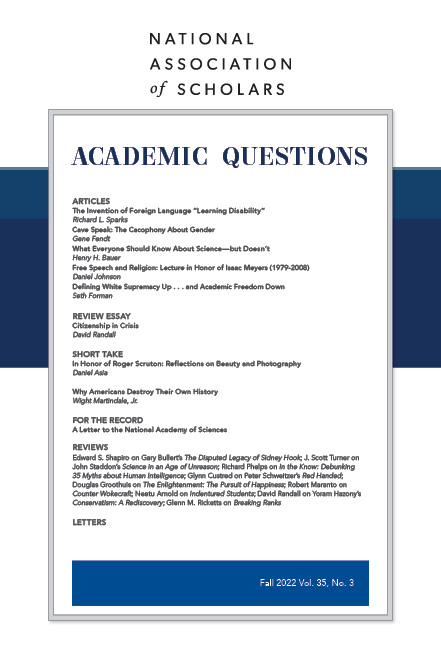To the Editor:
John Staddon’s article, “The Faith of Science” (Summer 2022), clearly and succinctly argued that the moral principles necessary for profitable scientific endeavor do not come from science itself, as many claim. However, Staddon did not complete the argument concerning those principles. If there is no source for these principles, then they are arbitrary, and nihilism results. Staddon does not accept that. But if they are not arbitrary, but rather true and objective principles, then they need an objective justification. The best explanation for their existence is a transcendent source of objective moral value based on the character and plan of God, as was believed by the proponents of the Scientific Revolution.
Douglas Groothuis, Ph.D.
Professor of Philosophy,
Denver Seminary
John Staddon replies:
Dr. Groothuis seeks a source for the principles I proposed. My source is just a faith in the value of science. But of course these principles may be justified in other ways, such as the Christian religion, which was the faith of many scientific pioneers. The general point is that no principles, even those that make scientific activity possible, follow from the facts of science.
John Staddon
Duke University
To the Editor:
It is a pleasure to point out and applaud the quality and content of the excellent articles that appeared in the summer [2022] issue of AQ. The editor’s intro “Be a Mensch” had me going—Ms. Iannone hit a home run on a call to the Stoic ideal and a lot more. I read it twice and wish I could give such a wonderful summary of the essence of a virtuous adult life. Her essay was leavened with common sense and clear thinking that it is a stand alone masterpiece of what we call mother wit in the nonpolitical correctness world.
I was stunned by the magnitude of Dr. Rozado's efforts and scholarship and the evidence he assembled from a deep and wide granular analysis of postmodern/grievance memes and themes in academic journals and the lay press (“The Prevalence of Prejudice and Social Justice Themes in the Academic Literature.”) Imagine a lexis type scan of articles and for fifty years, 170 million academic fifty million general publication articles. “Who could match that effort?” is the first thing I thought, and then I was impressed with his methods and analysis, so much so that I sent it to many friends and colleagues and I was asked by one of those colleagues to do a formal article review for an internet site.
The next three papers by three professors were excellent. They worked like the three tenors on the multifarious fallacious thinking of the critical race theory advocates (Douglas Groothuis, “Critical Race Theory in Six Logical Fallacies”), the inane but well worn “lived experience” fallacy (Tim Hsiao, “The Lived Experience Fallacy”), and the honored and essential elements of scientific inquiry (John Staddon, “The Faith of Science”). The three authors obeyed the basic rule—brevity is the soul of wit—and, I think, good teaching. So the three papers surrounded and captured an opportunity to teach about scientific methods and dangerous fallacies—erudite, thoughtful and insightful, but most of all efficient, no wasted space or words, impressive.
Next came the compelling story of a sensible art educator Michelle Kamhi, “Confronting Woke Groupthink in Art Education,” surrounded by an intolerant woke and close-minded censorious gang of art educators who were captives of the Marxist/socialist/grievance hustler groupthink world of the National Art Education Association (NAEA). What could go wrong if art educators hate Western culture because of political ideology? I thought the article would not be so interesting or compelling, but Ms. Kamhi did to me what Roger Scruton did—she reminded me of the importance of art as a part of culture. She told a very important story that invigorates my
antagonism to the chattering class. The only things missing in her essay were reminders of the noise constantly emanating from PBS and NPR on the taxpayer dime.
Attorney James Springer wrote a wonderful summary of the taxonomy of political philosophy (“Three Public Philosophies and Some Implications”), starting with some easy stuff and progressing to the permutations and deviations that happen when a concept gets put under the hood of the human population. . . . I particularly liked his discussion of what might be called the intellectual underpinnings of civil society: values and respect for the acquisition of knowledge and the importance of the individual. With that beginning he then provided examples of how hierarchical systems have some advantages only appreciated when the predictability is gone . . . Mr. Springer deftly explained identity politics, postmodernism, wokeism, grievance hustling that leads to totalitarianism.
Dr. Platt (Michael Platt, “What, After Speech Is Free, Shall We Say?”) provided an eloquent essay on the importance of speech and the value of open debate and discussions of the Western Canon and its foundational thinkers . . .
I could go on—there were two fine tributes to the late critic Midge Decter—but suffice it to say, the issue was chock full of good writing and ideas, every effort deserving my gratitude and praise.
John Dale Dunn, MD, JD
Brownwood, TX













